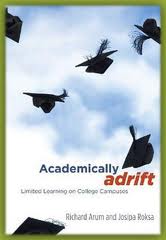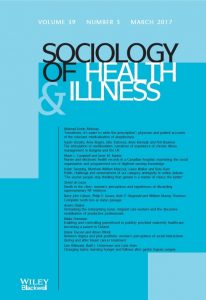Book Review – Academically Adrift by Arum and Roksa
 Bless your hearts, Richard Arum and Josipa Roksa, for calling on institutions of higher education to prioritize undergraduate learning. With Academically Adrift: Limited Learning on College Campuses (University of Chicago Press 2011), sociologists Arum and Roksa argue that undergraduate students seem to learn very little in college, and that in fact they (Arum and Roksa) can show just how much those undergraduates are learning by bringing their own quantitative data set Determinants of College Learning (DCL)—which surveys over 2,300 full time students at 24 four-year institutions on questions of family background, high school grades, and college experiences—together with scores from the Collegiate Learning Assessment (CLA), a standardized test that analyzes “core outcomes espoused by all of higher education”: critical thinking, problem solving, and writing.
Bless your hearts, Richard Arum and Josipa Roksa, for calling on institutions of higher education to prioritize undergraduate learning. With Academically Adrift: Limited Learning on College Campuses (University of Chicago Press 2011), sociologists Arum and Roksa argue that undergraduate students seem to learn very little in college, and that in fact they (Arum and Roksa) can show just how much those undergraduates are learning by bringing their own quantitative data set Determinants of College Learning (DCL)—which surveys over 2,300 full time students at 24 four-year institutions on questions of family background, high school grades, and college experiences—together with scores from the Collegiate Learning Assessment (CLA), a standardized test that analyzes “core outcomes espoused by all of higher education”: critical thinking, problem solving, and writing.
Democracy depends upon education that prepares its members for full participation, Arum and Roksa rightly contend. It depends on education to help members develop the critical reasoning and communication on which democratic participation is founded. What’s needed then, they say, are “objective measures” of students’ learning in relation to their social backgrounds and education experiences. Such measures, Arum and Roksa continue, will hold institutions accountable and will fight the enemy they have named “limited learning,” or more precisely, the “absence of growth in CLA performance” (122).
Arum and Roksa claim to “illuminate the multiple actors contributing to the current state of limited learning on college campuses” (120): students themselves, faculty members, administrators, and cultural messages of “college for all” in which the only measure of that access is the college credential that seems to say less and less about college learning. Yet Arum and Roksa remain unclear as to how those actors are positioned within multiple, intersecting systems of power. They remain unclear as to how schools and formal education itself are positioned within those multiple, intersecting systems of power.
Basil Bernstein (1977) and Paul Willis (1977) have discussed in different ways how education is a major force in structuring student experiences –and how the structure and culture of schools influences how students understand their own identities. Clearly passing over the arguments of Willis and Bernstein, Arum and Roksa call for “as much attention on monitoring and ensuring that undergraduate learning occurs as elementary and secondary school systems are currently being asked to undertake” (55). But the students who arrive on college campuses have more than likely spent up to twelve years in those elementary and secondary classrooms that are being so thoroughly monitored. These undergraduate students’ learning experiences and their ideas about learning cannot not have been shaped by these monitoring practices. But any role this might play in Arum and Roksa’s notion of limited learning is never discussed.
Arum and Roksa assume instead that learning is something that can be calculated. And that those calculations exist objectively and without connection to a political context. They assume that skills that can be “mastered” completely for participation in “today’s complex and competitive world” (31) rather than continuously engaged through the sort of “restless, impatient, continuing, hopeful inquiry” that Paulo Freire (1968: 72) envisions. They assume that critical thinking is something that can be “banked” in students by assigning certain numbers of pages of reading and writing and by encouraging students that the most effective means of study is to study alone rather than in dialogue (115-6). Critical thinking as Arum and Roksa present it, is not then about engaging with the world and with others, but rather seems to focus more on the about efficiently “receiving, filing, and storing” of information.
The data that Arum and Roksa provide on CLA scores tabulated by race and ethnicity reveal that the test on which Arum and Roksa base much of their argument is clearly not so neutral. How is it that Whiteness can correspond to superior problem-solving unless there is something about the way the test conceives of and measures “problem-solving”?
Collegiate Learning Assessment: Mean Scores
(Four-Year College/University Students) 2006
Source: http://www.highereducation.org/reports/pa_aclearning/performance.shtml
Without acknowledging the political location of their own work and of the sorts of practices called for in it, Arum and Roksa present an idea of higher education stripped of imagination and possibility – stripped of the idea that possible futures do not have to look exactly like what is on display today. I whole-heartedly celebrate Arum and Roksa’s desire to make higher education “meaningful and consequential for students” (55), but Academically Adrift is not about engaging students – it rather seems to be about them as containers for holding fixed ideas and as technicians for discrete tasks that some external and allegedly objective entity has decided are definitive measures of critical thought and problem-solving.
More meaningful questions about undergraduate learning would likely not ask how to measure critical thinking or how to create an index of academic rigor. More meaningful questions would likely come from a different starting point: questions that look to students’ classroom experiences, to their broader social experiences, and to the structural contexts and the intersecting systems of power in which those experiences are situated. The classroom can be oppressive or it can be emancipatory. It can be privatized, individualized, compartmentalized – or it can be a place where students question each other and question what they are learning to try to situate it in relation to their world. When the latter is foregrounded, the classroom can be a space of democracy: one where students may come to realize that democratic possibilities don’t have to look like the kinds of democracy currently on display.









This review was predictable but pertinent up until the last paragraph. Then it goes off the rails, celebrating the open, democratic, emancipatory classroom, as if that classroom can be divorced from a field of power, the bastard love child of Paulo Freire and “Dangerous Minds”.
The isolated classroom will never be an emancipatory space of democracy where students question each other and question what they are learning to try to situate in in relation to their world as long as that world is oppressive and the university (an institution not reducible to a classroom writ large) reproduces that oppression. One may get a classroom where students perform an emancipated consciousness to impress the sociology prof who desperately wants to believe that s/he is engaged in a “pedagogy of the oppressed”. (A pedagogy of the easily impressed, more like it.) Perhaps, in some rare instances, the students will come to share the professor’s fantasy. But the structures of oppression will reassert themselves in the (not-so-very) long run, and that emancipatory class will be long forgotten.
If, on the other hand, one wants to equip students for the increasingly desperate struggles ahead, one would do well to heed Arum and Roksa’s work on environmental effects (slighted by this review). High expectations, substantial reading and writing, elevated time on task may not be sufficient for kind of “critical thinking” we want, but they are surely necessary. Unless, of course, we’re satisfied to send our students out as “conscienticized” sheep among wolves.
Hi Michael!
Thanks for reading and for your comments. What I am arguing for is certainly not an “isolated classroom” but the classroom as a space where students there is ongoing consideration of how course content AND pedagogical practices facilitating interaction with that course content allow students to develop connections between their own lives and classroom experiences.
You’re right – a “bastard love child of Freire and Dangerous Minds” sounds pretty awful. I will surely have to work not to give this impression in the future. But to address your comment about sociology professors believing themselves to be engaged in a pedagogy of the oppressed, I think you may be limiting the very relevant questions Freire poses in his work to the particular group of people that Freire himself wrote about. I don’t work with adult literacy students in Brazil (though I did work with adult literacy students here in the US) — and I am very well aware that the college classroom tends to be quite a privileged space, one that certainly does not equate to the situation of the learners whom Freire described as oppressed. To engage with and appreciate the questions that a thinker/writer/scholar poses, and to put those questions in conversation my your own ideas and observations is certainly not to claim that my ideas stem from a situation equivalent to Freire’s. Again, I’ll have to work to make that more clear in the future. Thanks, Michael!
Margaret,
I had not heard of Academically Adrift until this past weekend at Lilly, and so went to look for reviews and lo and behold, yours was the first one I found! I find it sad that in this day and age with all that is known about the brain that trained sociologists would reduce intelligence to a score on a test. Despite giving lip service to Freire’s critique of banking education, education at that highest levels seems to be moving in that direction. Thanks for raising good questions
I find it hard to believe that trained sociologists expect all data collection to be contextual- perhaps one is unaware of the difficulties involved with collecting such a large body of information without having some limitations. We get what information we can get and glean from it what we can by piecing together what we have from other analyses. This is science after all…not philosophy.
Arum and Roksa provide little contextualization of their findings…something I find mildly frustrating. However, they also provide a great deal of raw information that can be used to extend a wide range of theoretical discussion as well as additional work.
The study was about higher education- not education as a whole. It is therefore not their responsibility to evaluate the k-12 system- and I’m glad they didn’t. The only pedagogical “truth” that they challenged was Coleman and (let’s face it) that is being done everywhere in the sociology of education. There is nothing really new here- except a sea of extremely valuable data that provides a launching pad for a lot of future research.
I applaud Arum and Roksa for a job well done.